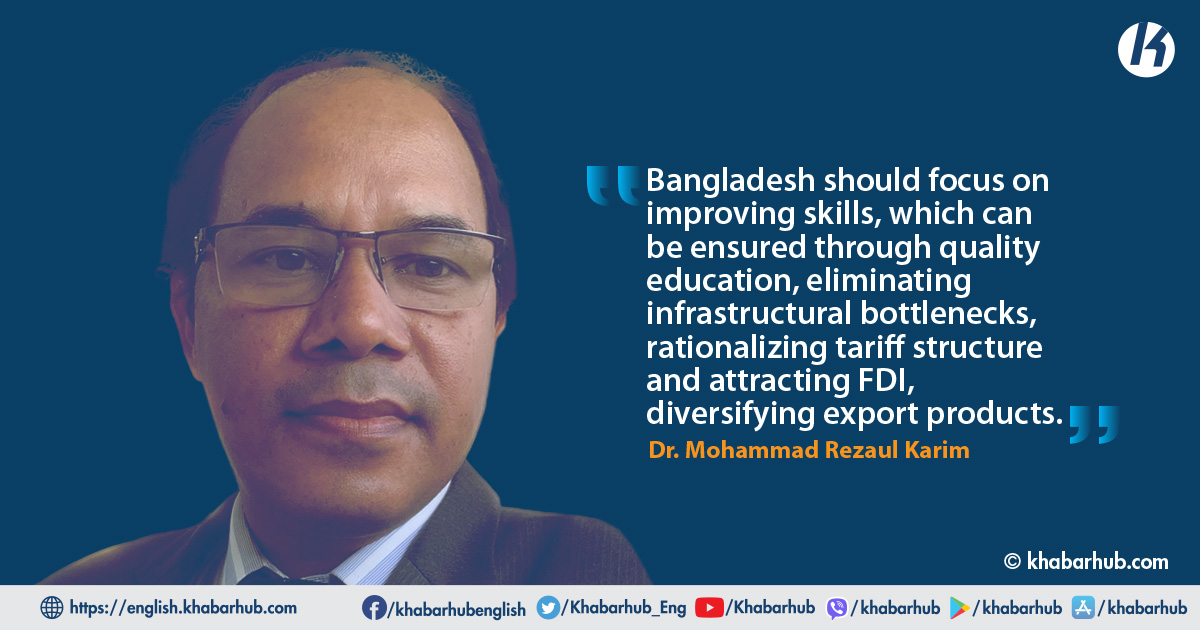The United Nations General Assembly UNGA) has adopted a historic resolution to graduate three nations i.e. Bangladesh, Nepal and Lao People’s Democratic Republic.
In the 76th UNGA resolution, three countries have been given an exceptionally five years period to graduate from LDC to a middle-income country.
Extended five years instead of standard three years is set to enable them to prepare for graduation to reverse the socio-economic damage incurred by the COVID-19 shocks by undertaking post-covid-19 recovery implementation policies and strategies.
For Bangladesh, the UNGA declaration came as the historic moment at the time of celebrating the country’s 50th anniversary of independence and the birth centenary of the Father of the Nation Bangabandhu Sheikh Mujibur Rahman. What a momentum of celebration and joyous situation!
In terms of graduating to a middle-income country (MIC), each country needs to meet three eligibility criteria, such as human assets index (HAI), economic and environmental vulnerability index (EVI), and gross national income (GNI). Bangladesh is well ahead in the GNI and its per capita income is $2591 against the threshold of $1222.
Bangladesh is trying to be included in GSP plus to get the GSP benefit after 2024. If this advantage is not achieved, Bangladesh would have to pay customs duty on at least 12 export items to enter the EU market.
Bangladesh has 75.4 points score in HAI against 66 and 27.3 in EVI, which should be less than 32. Similarly, Nepal and Lao PDR obtained three criteria to satisfy to be graduated.
However, graduation brings some restrictions and challenges that must be addressed. Compared to these two recently graduated countries, Bangladesh is different in many aspects with more diversified challenges.
Post-LDC graduate in Bangladesh may face numerous challenges forecasted by economists. This demands to look for ways of increasing exports.
The key challenges include the loss of duty-free access to various international markets; the reduction of import duties in the interest of signing free-trade agreements and the shrinking of opportunities to provide cash assistance on exports. These setbacks would impact the economy and socio-cultural array.
The most impacting sector is export. And Bangladesh’s export is dominated by the apparel industry. A recent report on ‘Textiles and Clothing in Asian graduating LDCs: Challenges and options’ prepared by three organizations of the UN forecast that Bangladesh’s economy would face difficulty because of imposing import duty on this sector.
Bangladesh may lose 5370 million dollars which is 14.28 percent of the country’s total export.
Moreover, dependency on remittance of migrant workers must be lessened. Rather they should be taken back to Bangladesh to utilize their skills for our own development.
The report also states Bangladesh would be a loser than the other LDC graduated countries like Nepal, Lao PDR, Myanmar. It is estimated that export may decrease 499.10 (3.83%), 21 (2.48%), 66.30 (1.45%) million dollars for Myanmar, Nepal and Lao PDR respectively.
Bangladesh is trying to be included in GSP plus to get the GSP benefit after 2024. If this advantage is not achieved, Bangladesh would have to pay customs duty on at least 12 export items to enter the EU market.
Only for apparels exports from Bangladesh to the EU, the average tariff rate will rise to nearly 12% from zero at present.
Although exclusion to GSP plus may negatively impact our apparel industry, emphasizing GSP benefit may not give long-term benefit to Bangladesh since we have to survive in the competitive market in the long run.
As a result, economists stressed to pay attention to the positive international support measures necessarily important for diversification of the economy, for enhancing labor productivity and bringing down the cost of business.
As the country has set ambitious targets to achieve SDGs by 2030 and a higher-income country by 2041, it is important to adopt pragmatic policy initiatives for the best utilization of time.
Retaining GSP facilities is a much talked about and emphasized issue, which may not give the desired benefit in the long run unless Bangladesh can adopt sustainable measures.
Bangladesh needs to have richly divergent patterns of the plan for development including research and development for sustainable graduation.
So, Bangladesh should focus on improving skills, which can be ensured through quality education, eliminating infrastructural bottlenecks, rationalizing tariff structure and attracting FDI, diversifying export products.
Moreover, dependency on remittance of migrant workers must be lessened. Rather they should be taken back to Bangladesh to utilize their skills for our own development.
This process will not only stop brain drain but also help utilize brain gain. The demographic dividend that Bangladesh is currently enjoying is a distressing issue for delaying the achievement of the development vision by 2041.
Transformation of a huge population to aging people will require inclusive and wider social safety net programs.
In order to overcome the challenges emanated as a consequence of LDC graduation, long-term and pragmatic plans are urgently important.
Bangladesh needs to have richly divergent patterns of the plan for development including research and development for sustainable graduation.
The sanction of 1340 million takas to address the trade challenge is quite noteworthy in this regard.
However, plausible consequences in the field of the social and cultural arena should likewise be identified and exact measures should be taken well ahead so that the progress of total development is never threatened and stalled.









Comment